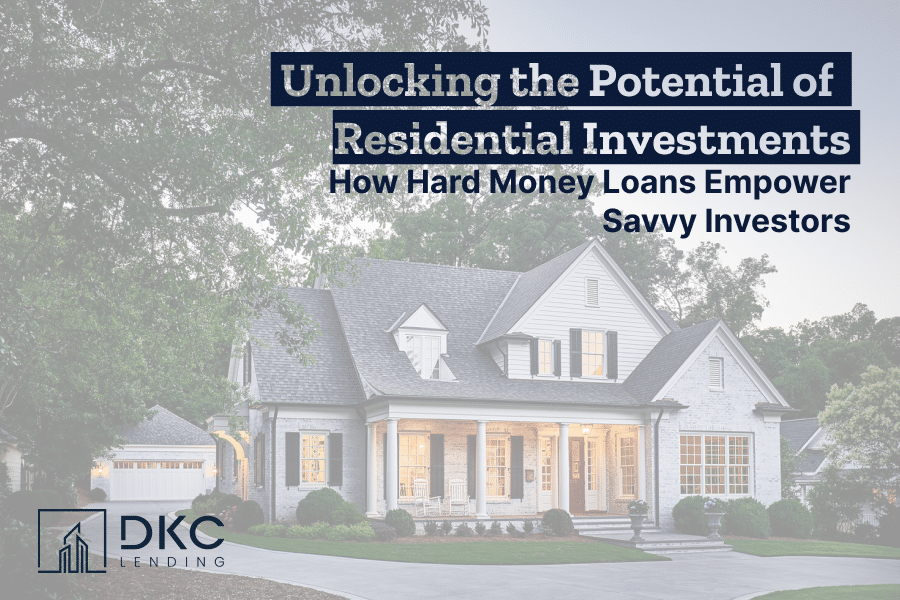Residential real estate investing is a popular strategy for generating wealth and achieving
financial independence. However, securing the necessary financing for these investments can
be a significant challenge, especially for properties that require extensive renovations or rapid
acquisition. In this competitive market, hard money loans have become a crucial financing tool
for savvy investors. These loans prioritize the potential of the property itself, providing
flexibility, speed, and accessibility that traditional financing options often lack. We explore the
advantages of hard money loans for residential property investors, highlighting how they can
unlock new opportunities, mitigate risks, and maximize returns.
Challenges in Securing Traditional Financing for Residential Investments
Securing financing through traditional channels can be extremely difficult for residential real
estate investors. Conventional lenders have stringent requirements that often exclude
investment properties, particularly those that require significant upgrades or repairs. Here are
some common hurdles that investors face:
Time-Consuming Approval Processes: In the world of real estate investing, timing is everything.
Opportunities can arise and disappear quickly, leaving little room for delays. Conventional
lenders often have lengthy approval processes, which can cause investors to miss out on high-
potential deals.
Limited Funding for Non-Turnkey Properties: Many investment opportunities involve
properties that need renovation or are in less-than-perfect condition. Traditional lenders tend
to avoid financing properties that are not move-in ready, limiting the options for investors
specializing in fixer-uppers or distressed properties.
Strict Criteria for Property Conditions: Conventional lenders often require properties to meet
specific standards before approving a loan. These standards can be a significant obstacle for
investors purchasing, renovating, reselling, or renting out older or distressed homes.
Limited Flexibility in Loan Terms: Traditional financing lacks the flexibility for short-term
investments or properties requiring a quick turnaround. Investors often need funding with
adjustable terms to match the specific timeline and goals of their project.
These limitations lead many real estate investors to seek more adaptable and faster financing
options like hard money loans.
The Hard Money Lending Advantage for Residential Investments
Hard money loans provide an effective alternative for residential real estate investors looking
to seize opportunities quickly and finance properties that may not qualify for traditional
financing. Here are some reasons why hard money loans have become a go-to solution for
residential investors:
Fast and Efficient Funding: One of the biggest advantages of hard money loans is the speed at
which they are processed. Unlike traditional financing, which can take weeks or even months to
finalize, hard money loans can be approved and funded within days. Fast funding allows
investors to capitalize on time-sensitive deals without delay.
Focus on Property Potential: Hard money lenders prioritize the value of the property and its
after-repair value (ARV), making them more willing to finance homes that require renovation.
This approach shifts the focus from the investor’s financial background to the potential of the
investment itself.
Flexible Terms: Hard money loans offer flexibility regarding interest rates, repayment
schedules, and loan durations. Investors can access loan structures that align with their specific
needs and project timelines, making hard money loans an ideal solution for various investment
strategies.
Higher Loan-to-Value Ratios: Hard money lenders often provide higher loan-to-value (LTV)
ratios compared to conventional lenders. Higher LTV means that investors can secure a larger
percentage of the property’s value upfront, reducing the amount of cash needed to initiate a
deal and freeing up capital for additional investments. These advantages make hard money
loans a powerful tool for real estate investors looking to grow their portfolios and achieve
higher returns.
Case Study: Revitalizing a Distressed Property with Hard Money Loans
To illustrate the benefits of hard money loans, consider the example of Alex, a real estate
investor specializing in residential properties that need significant renovations. Alex discovered
a neglected single-family home in a desirable neighborhood that had been sitting on the market
due to its poor condition. The property required substantial updates, including a new roof,
electrical work, plumbing, and cosmetic upgrades. Due to the property’s condition,
conventional financing was not an option. Alex approached a hard money lender who evaluated
the property’s potential, focusing on the after-repair value rather than the current state. Within
days, Alex secured the necessary funding and began renovations immediately. Alex completed
the renovations four months later, transforming the property into a modern, attractive home.
The property sold quickly, generating a significant profit. This success was made possible by the
fast approval, flexible terms, and property-focused approach of hard money lending.
Strategic Benefits of Hard Money Loans for Residential Investments
Hard money loans offer several strategic advantages, making them an attractive choice for real
estate investors. Here are some key benefits that investors can leverage:
Speed is the Key to Securing the Best Deals: In competitive real estate markets, properties can
be listed and sold within days. Hard money loans provide the quick funding needed to make
competitive offers and secure desirable properties before other investors snap them up.
Flexibility to Finance Fixer-Uppers: Conventional lenders often overlook properties that require
significant repairs. Hard money loans are specifically designed to support renovation projects,
allowing investors to purchase and improve distressed properties confidently.
Maximizing Returns Through Value-Add Projects: Hard money loans enable investors to
finance both the acquisition and renovation of properties, providing the capital necessary to
increase a property’s value. This allows for greater profits when the property is sold or rented.
Leverage for Building a Diverse Portfolio: By using hard money loans, investors can minimize
the amount of upfront cash needed for each property, freeing up capital to pursue multiple
investments simultaneously. This approach accelerates the growth of a diversified real estate
portfolio.
Key Considerations for Using Hard Money Loans
While hard money loans offer many benefits, they also come with unique factors that investors
need to consider to ensure successful outcomes:
Interest Rates and Costs: Hard money loans typically have higher interest rates than other
financing options. Investors must carefully assess the total cost of borrowing to ensure that the
investment remains profitable.
Loan Duration: Hard money loans are generally short-term, ranging from six months to two
years. Investors should have a clear timeline for completing their project and a plan to sell,
refinance, or rent the property within the loan’s term.
Importance of After-Repair Value (ARV): The ARV is a critical factor in determining the loan
amount for hard money loans. Accurate estimates of renovation costs and future property
value are essential for securing favorable loan terms.
Exit Strategy: Investors should have a well-defined exit strategy before taking out a hard money
loan. This could include selling the property after renovation, refinancing it into long-term
financing, or renting the property to generate cash flow.
Practical Tips for Making the Most of Hard Money Loans
To maximize the benefits of hard money loans, real estate investors should follow these best
practices:
Work with Experienced Lenders: Not all hard money lenders are created equal. Choose a
lender with a solid track record in residential real estate and a reputation for transparent,
reliable service.
Prepare a Detailed Investment Plan: Presenting a clear and thorough plan to a hard money
lender can help secure better loan terms. This plan should include renovation timelines, cost
estimates, market analysis, and anticipated returns.
Budget Carefully: Accurate budgeting is crucial for a successful project. Be realistic about
renovation costs and market conditions to ensure that the project will be profitable, even after
accounting for higher interest rates.
Maintain a Strong Exit Strategy: A clear and realistic exit strategy is essential for repaying the
loan and avoiding additional fees. Whether selling, refinancing, or renting, have a concrete plan
in place before securing financing.
Conclusion
Hard money loans have revolutionized the way residential real estate investors approach
financing. By offering rapid funding, flexible terms, and a focus on the property’s potential, hard
money loans empower investors to take advantage of high-potential opportunities that would
be impossible with conventional financing. Whether your are a seasoned investor or just
starting, hard money loans provide a practical solution for growing your real estate portfolio,
maximizing profits, and overcoming the challenges of traditional financing. For investors
seeking to expand their residential real estate holdings, partnering with a reliable hard money
lender like DKC Lending is a smart move. With the right lender, investors can access the funds
they need quickly, capitalize on undervalued properties, and achieve their financial goals in a
competitive market.


